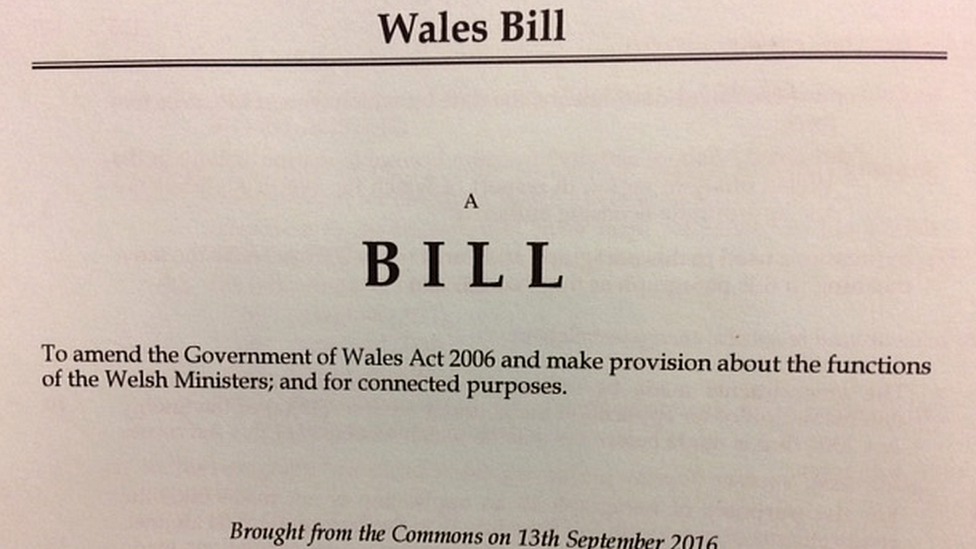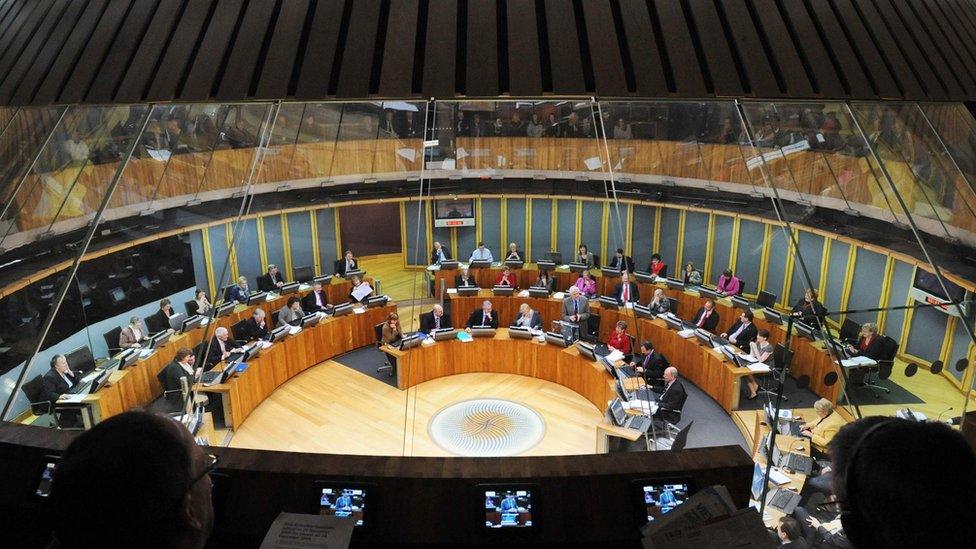Wales Bill support from AMs 'not foregone conclusion'
- Published
Mark Drakeford says the deal on funding does not guarantee support for the Wales Bill
It is not a "foregone conclusion" that AMs will back the next stage of devolution in a vote next week, the Welsh finance minister has said.
Mark Drakeford said a new agreement on funding had removed a barrier to supporting the bill but parties would be "weighing it up" over the weekend.
AMs will decide on Tuesday whether to support the UK government's Wales Bill.
A UK government source said anger among assembly members about the bill was "synthetic".
Wales Office minister Lord Bourne has warned that a rejection in the assembly would stop the bill becoming law.
The Wales Bill includes new powers for the assembly and changes how devolution works. It has been criticised for potentially resulting in a reduction in law making powers for AMs.
UKIP is expected to vote against the bill in the Senedd and the Tories are expected to vote for it, while Labour and Plaid Cymru are yet to make a decision.
The UK government narrowly avoided defeat in the House of Lords over the Wales Bill on Tuesday night.
Giving evidence to the assembly's finance committee on Wednesday, Mr Drakeford said an agreement struck with the Treasury before Christmas on a "fiscal framework" which sets out how Wales will be funded in the future had removed a "barrier" to supporting the Wales Bill.
The framework details how a reduction to Wales' block grant from the UK Treasury would be calculated when the Welsh Government takes control of some taxes, potentially including a portion of income tax.

Mr Drakeford said future funding was now a "neutral" matter with regard to the Bill and the deal did not guarantee support for it.
"The fiscal framework is no longer an impediment to people voting for the Wales Bill if they think the Wales Bill is worth voting for on its own terms," he said.
"Had we not had a fiscal framework that could be supported in that way it would have been a very significant barrier to supporting an LCM [Legislative Consent Motion] on the Wales Bill and the Treasury were very well aware of that."
But he added: "I don't think it's a foregone conclusion even today that the assembly will vote for the Wales Bill, which was still alive in front of the House of Lords yesterday.
"So I think parties will be weighing it up over the weekend and into next week."
A UK government source said there was "synthetic anger" in the assembly about the Wales Bill.
The source said there was "no appetite" in Westminster to prolong the process - and described the fiscal framework as a "remarkable deal" from the Treasury.
The Wales Bill would allow the Welsh Government to take partial control of income tax without having to call a referendum.
It also offers new powers to the assembly over its own affairs - such as how elections take place and the institution's name - as well as on energy and transport.
And recent additions have been made, including power over teachers' pay and conditions, and confirmation that Cardiff Bay has the power to bring in a smacking ban.

How might the parties vote?

The Wales Bill proposes new powers for the National Assembly for Wales
Labour is likely to decide its position at a group meeting on Monday evening.
However a Welsh Government source indicated that it is likely Labour will support the bill, with the argument that there may not be any further changes for a decade swaying some.
Unsurprisingly, given the legislation is coming from a Conservative UK government, the Tories in the assembly will back it.
That would provide enough AMs for the vote to pass.
BBC Wales understands Plaid Cymru will consult its national executive over the weekend and that several members think the party should vote against the bill.
UKIP will vote against the bill as the party opposes the Welsh Government being able to take partial control of income tax without needing a referendum.
A spokesman for the party said the clause in the bill removing the referendum requirement was a "breach of faith with the Welsh people calculated to perpetuate the belief that politicians cannot be trusted to keep their promises".
- Published11 January 2017
- Published8 January 2017

- Published10 January 2017

- Published29 February 2016
